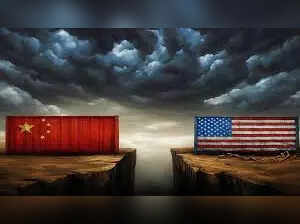The US-China Trade War: Beijing's Efforts To Mask Economic Damage

Table of Contents
Manipulating Economic Data
One of Beijing's primary strategies has been the manipulation of economic data. Altering GDP figures, inflation rates, and other key indicators can effectively obscure the true impact of tariffs and trade restrictions imposed during the US-China trade war. This data falsification makes it difficult to assess the actual economic consequences, allowing the government to present a picture of continued growth and stability even amidst significant challenges.
- Examples of discrepancies: Independent analyses frequently show discrepancies between official Chinese economic data and estimates from international organizations like the IMF and World Bank, suggesting a potential underreporting of negative economic impacts from the trade war. Specific sectors like manufacturing and agriculture, heavily reliant on exports, may be experiencing greater hardship than official reports suggest.
- Challenges in verification: Verifying the accuracy of Chinese economic data remains a significant challenge. Access to granular data is often restricted, and independent audits are rare. This lack of transparency makes it difficult for researchers and analysts to form a complete picture of the economic reality.
- Sectoral impacts: While the official narrative often depicts resilience, anecdotal evidence and independent analyses point to significant challenges in specific sectors. Manufacturing, in particular, suffered from reduced export demand, impacting employment and investment. Similarly, the agricultural sector faced difficulties, highlighting the vulnerability of China's economy to external shocks.
Strategic State Intervention and Subsidies
To mitigate the visible effects of the US-China trade war on specific sectors, the Chinese government employed widespread state intervention and subsidies. Bailouts and financial support packages were channeled to struggling industries, preventing widespread bankruptcies and maintaining employment levels. This approach, while seemingly effective in the short term, masks the underlying economic vulnerabilities and carries significant long-term consequences.
- Industries receiving support: Significant state support was directed towards sectors heavily impacted by the trade war, including manufacturing, technology, and agriculture. These interventions, while cushioning the immediate blow, can distort market mechanisms and hinder the efficient allocation of resources.
- Long-term consequences: The heavy reliance on state intervention and subsidies creates moral hazard, potentially hindering innovation and efficiency in the long run. Furthermore, the vast financial burden on the government represents a hidden cost that may have implications for future fiscal policy.
- Financial burden: While the exact figures remain opaque, the scale of government spending on subsidies and bailouts is substantial. This significant financial commitment, financed through borrowing or increased taxation, ultimately impacts the long-term sustainability of the Chinese economy.
Censorship and Control of Information
The Chinese government employed strict censorship and control over information to limit the dissemination of negative news about the economic consequences of the trade war. Restrictions on media reporting, online discussions, and academic research stifled critical analysis and ensured a largely positive narrative was maintained in the public sphere.
- Suppressed news: Numerous instances of suppressed news stories and critical analyses relating to the economic impact of the trade war have been documented by international organizations and journalists. This information control shapes public perception and limits accountability.
- Challenges for independent journalists: Independent journalists and researchers in China face significant challenges in reporting on sensitive economic topics. Self-censorship, fear of reprisal, and limited access to information create a biased information landscape.
- Impact on public perception: By controlling the flow of information, the government effectively shapes public perception of the trade war's impact, creating an atmosphere of stability and minimizing public anxieties. This controlled narrative, however, prevents a realistic assessment of the situation and limits the potential for necessary policy adjustments.
Shifting Focus to Domestic Consumption
To offset reduced export demand caused by the US-China trade war, Beijing strategically shifted its focus to promoting domestic consumption. Stimulus packages, tax cuts, and infrastructure projects were implemented to boost domestic demand and reduce reliance on exports.
- Effectiveness of stimulus: The effectiveness of these stimulus packages in fully compensating for lost export revenue is debatable. While domestic consumption increased, it has not fully offset the decline in export-driven growth.
- Challenges in shifting reliance: Shifting from an export-oriented economy to a consumption-driven model is a complex and long-term process that faces significant challenges, including structural imbalances and consumer confidence.
- Long-term implications: The long-term implications of this shift remain to be seen. Success depends on a range of factors, including income distribution, infrastructure development, and the ability to create a robust domestic market.
Conclusion
Beijing employed a multifaceted strategy to mask the economic damage inflicted by the US-China trade war. This involved manipulating economic data, providing strategic state intervention and subsidies, exercising strict censorship and information control, and attempting to shift focus towards domestic consumption. However, the limitations of official data and the prevalence of anecdotal evidence highlight the importance of independent analysis for a comprehensive understanding of the situation. Further research into the true economic impact of the US-China trade war on China is crucial for informed policymaking and a clearer understanding of Beijing's economic strategies. Continue exploring the intricacies of the US-China trade war and the methods employed by Beijing to mitigate its economic damage.

Featured Posts
-
 International Harry Potter Day Find The Perfect Fan Merchandise Online
May 02, 2025
International Harry Potter Day Find The Perfect Fan Merchandise Online
May 02, 2025 -
 Keller Williams Welcomes New Arkansas Affiliate
May 02, 2025
Keller Williams Welcomes New Arkansas Affiliate
May 02, 2025 -
 Bbc Celebrity Traitors Sibling Withdrawals Create Filming Chaos
May 02, 2025
Bbc Celebrity Traitors Sibling Withdrawals Create Filming Chaos
May 02, 2025 -
 Community Gathers To Remember Poppy Atkinson Manchester United Fans Funeral
May 02, 2025
Community Gathers To Remember Poppy Atkinson Manchester United Fans Funeral
May 02, 2025 -
 Fortnite Down Detector Current Server Status For Chapter 6 Season 3 Galactic Battle
May 02, 2025
Fortnite Down Detector Current Server Status For Chapter 6 Season 3 Galactic Battle
May 02, 2025
